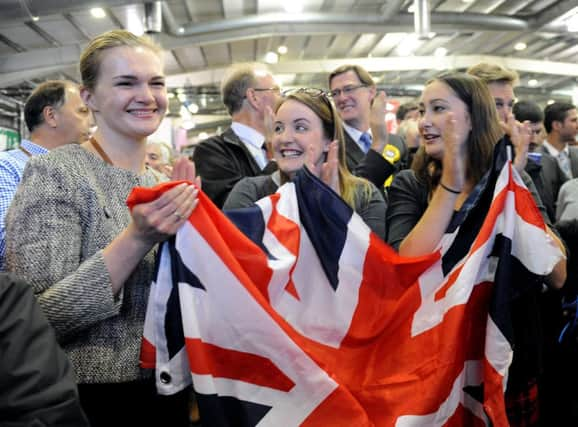Leader: Poll warning to unionists over devo u-turn


But, no, it seems a higher proportion of the electorate than actually voted No think there should be another referendum in the next ten years, according to an opinion poll.
Some will no doubt regard this view as distinctly perverse. After all, the 55 per cent who voted No might be assumed to be happy with the result and have no wish for a replay. And Alex Salmond, before the vote at least, did say this was a once-in-a-lifetime or once-in-a-generation chance for the Scottish people, implying no repeat for at least 25 years.
Advertisement
Hide AdAdvertisement
Hide AdSince the vote, however, he and Nicola Sturgeon, his successor-in-waiting, have refused to rule out a re-run. It might reasonably have been assumed that this was done simply to keep the flame of hope burning brightly among the independence-supporting faithful, especially among the 60,000 new recruits to the party. But now it seems their implication that there could be such a poll in the not-too-distance future is in tune with majority public opinion.
Interpreting why this might be, especially when it seems counter-intuitive, is not easy. It can perhaps be assumed that most of the 45 per cent who voted Yes are still faithful. And there may be some No voters who now wish they had voted Yes. But is it really the case that about a fifth of those who voted No have now changed their mind?
There is no evidence in the polling material to support that. While there is some evidence that some in the No camp might be persuaded to vote Yes if there was a Conservative victory at next May’s general election, or if all UK voters decided Britain should leave the EU, these are still hypothetical.
Since it seems clear majority public opinion favours a stronger Scottish Parliament with greater tax powers, it might be that some No voters are disappointed with the progress so far towards achieving that. But, again, this is also hypothetical, as well as premature. There may also be some No voters who believe 55-45 was not a decisive enough victory and want a re-run to beat independence more soundly.
It is hard to tell. Perhaps the most likely explanation is that voters, who like the idea of holding referendums as a general principle, have had that opinion confirmed by their experience and therefore think it is not a bad idea to hold another one. This may well include people who voted No. There is no indication how those who favour another one would actually vote.
Nevertheless, the findings serve the important political purpose of telling unionist politicians they cannot backslide on additional powers. The price they could pay for any such reneging has now been pretty clearly indicated by Scottish voters.
Holyrood reform plans welcome
Any democracy requires checks and balances in its institutional structures to ensure that elected governments cannot abuse their power. One of the most important of these is the ability of parliaments to scrutinise government legislation and actions.
Holyrood’s scrutinising ability, however, did not fully develop in the first three administrations, and it has been further undermined since 2011 when the SNP won more than half the seats at Holyrood. It meant the same party was not only able to form a government with an absolute majority but was also able to use that majority to wield considerable control over Holyrood’s committees, where most of the scrutiny function is supposed to be carried out.
Advertisement
Hide AdAdvertisement
Hide AdMany doubted Tricia Marwick, the parliament’s presiding officer, would dare to correct that fault, since she is also from the SNP. But now she has shown commendable independence of mind and put forward reform proposals.
Her idea that committee conveners should be elected by a
secret ballot is a good one. It would free those conveners to act much more independently of parties and government. It would also give them greater political and moral authority.
Some further safeguards should be considered. The proposal that conveners of the finance and public audit committees should have to come from opposition ranks has a lot of merit.
Ms Marwick’s ideas are several steps down the road towards a parliament fit for the purpose of serving the public, its main role. With her scrutiny of lobbying and all-party groups, she is showing herself to be a reforming presiding officer.